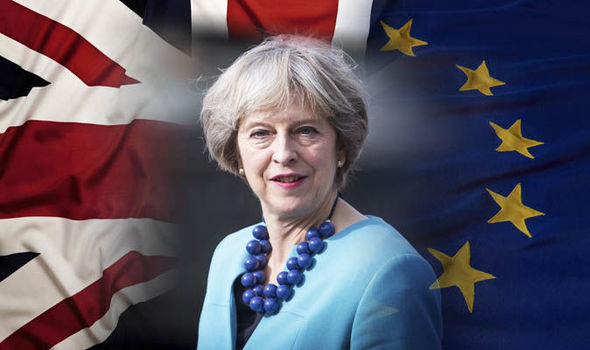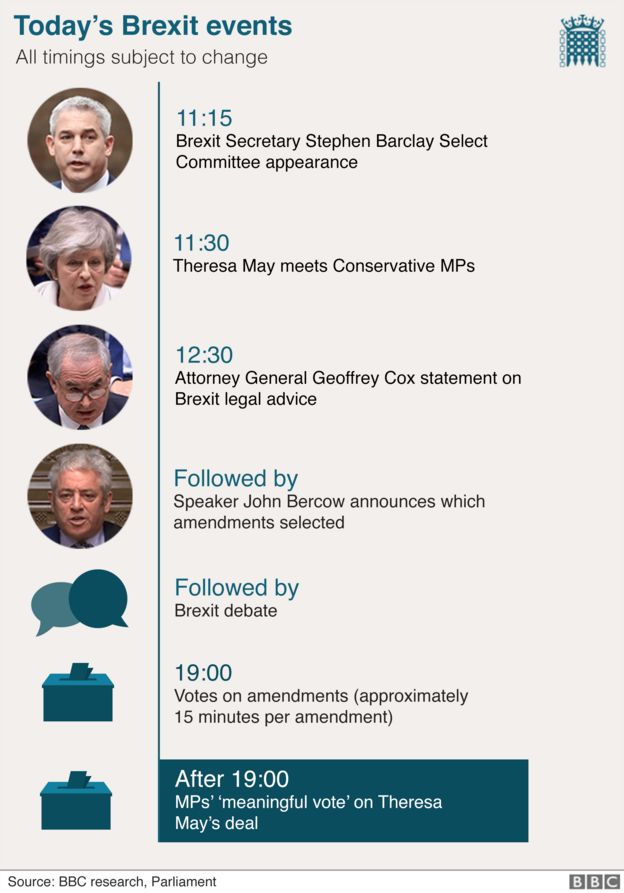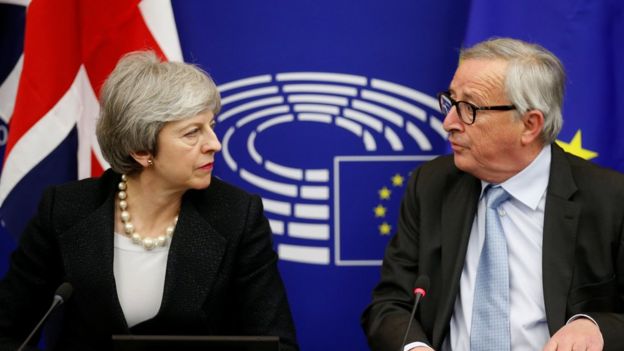
The PM says concerns that the Irish backstop, an insurance policy designed to avoid a hard border in Ireland, may “become permanent” have been addressed.
Attorney General Geoffrey Cox has published his updated legal advice before making a Commons statement.
Labour said the PM had secured nothing new and they would vote against.
The last time Mrs May’s withdrawal agreement was put to Parliament in January, it was voted down by a margin of 230.
- Reaction to May deal ahead of vote
- Has anything changed in the Brexit deal?
- Brexitcast: What happened in Strasbourg?
The BBC’s political editor Laura Kuenssberg said it would be a “political miracle of historic proportions” if Mrs May could overturn such a heavy defeat.
The PM will address a meeting of Tory MPs at 11.30 GMT.
An hour later, Mr Cox will face MPs to tell them if he has changed his opinion on the backstop, having concluded in December that the UK would not be able to leave the arrangement of its own accord and there was nothing in law to stop it “enduring indefinitely”.
The government’s senior law officer, whose advice has been shown to cabinet, has strongly dismissed suggestions he told ministers on Monday his view had not changed and he had been told to go away and think again.
What was agreed?
Documents were agreed after Mrs May flew to the European Parliament with Brexit Secretary Steve Barclay for last-minute talks with Mr Juncker and EU chief Brexit negotiator Michel Barnier.
- A “joint legally binding instrument” on the withdrawal agreement which the UK could use to start a “formal dispute” against the EU if it tried to keep the UK tied into the backstop indefinitely.
- A joint statement about the UK and EU’s future relationship which commits to replacing the backstop with an alternative by December 2020.
- A “unilateral declaration”. stating there is nothing to stop the UK from leaving the backstop if discussions on a future relationship with the EU break down and there is no prospect of an agreement.
Many MPs fear the backstop, initially agreed by the UK government in December 2017, would keep the country in a customs arrangement with the EU indefinitely.
The PM has claimed the new documents addresses this issue and urged MPs to back the “improved deal”.

The Democratic Unionist Party, whose support Mrs May relies on in the Commons, said it would be “scrutinising the text line by line” before deciding whether to give the PM their support.
- Newspaper headlines: ‘May of reckoning’ for Brexit deal
- Brexit: A really simple guide
- MPs respond to ‘changes’ in Brexit deal
Jacob Rees-Mogg, who chairs the influential European Research Group of MPs, said Mr Cox’s views and those of the group’s own lawyers were critical but essentially it was a political judgement for MPs.
“Does this deliver enough of Brexit to make this worth accepting?” he told the BBC.
Ex-Brexit Secretary David Davis has indicated he might be willing to support the deal if Mr Cox endorsed it, telling LBC if the attorney said it had legal force, it might “make this just about acceptable to me”.
Environment Secretary Michael Gove said it was “make up your mind time for MPs”, telling them “if you don’t take this prize, there is the real risk of you will see a diluted, softer or less palatable Brexit deal”.
Shadow Brexit Secretary Sir Keir Starmer said the withdrawal agreement and declaration on future relations had not changed as the extra assurances “were all there last time” MPs voted.
And Conservative Dominic Grieve, a former attorney general, said the UK would still not be able to terminate the backstop at a time of its own choosing.


Monday morning government blues have been replaced by Tuesday morning nervous hopes.
The government does not suddenly expect its Brexit deal to be ushered through at speed, cheered on by well-wishers.
It does, however, believe that Monday night’s double act in Strasbourg by Theresa May and Jean Claude Juncker puts it, to quote one cabinet minister, “back in the races”.
The extra assurances wrought from weeks of talks with the EU will move some of the prime minister’s objectors from the “no” column to the “yes”

The UK is set to leave the EU on 29 March 2019 after voting to leave by nearly 52% to 48% – 17.4m votes to 16.1m – in 2016.
Mr Juncker has warned MPs they would be putting everything at risk if they voted down the deal.
“In politics sometimes you get a second chance,” he said. “It is what we do with that second chance that counts. There will be no third chance.”
The Irish Prime Minister Leo Varadkar said the new agreements showed both sides’ “good faith” – although he made clear they did “not undermine” the principle of the backstop or how it might come into force.
RELATED ARTICLES
Recent Posts
- Big arrangements are made by a nervous Harris campaign to secure a close victory.
- Assault on peace: Hammas deadliest attack on israle on Oct 07 , instigated Midle East Crisis:
- Israel marked “solemn” anniversary commemorating 7/10 deadly attacks:
- Trump impeachment: Trump lashed out over his impending impeachment in an irate letter to Nancy Pelosi, accusing her of declaring “open war on American democracy”.
- hotness breaks its records in Australia :

